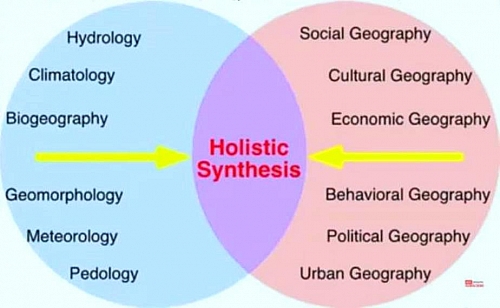There are different definitions of ‘geography and many misconceptions; many people have a vague knowledge of what geography is, it was thought to be about names of towns and rivers and population of people all over the world. Geographers where thought to be people who know how to draw maps. Geography is not just the memorization of places, names and it is not just a map-making, though both of these activities most certainly are important. Students often try to grasp at the definition using familiar stem, geography is the study of and insert such descriptors as landscapes, mountains, climates, rivers, and people among others. While a definition of this field of study no doubt includes such subject matter, it is essential for students to understand geographys unique way of studying the world.
Table of Contents
- Various Definitions of Geography by Different Scholars
- Eckermann, 1958
- Vidal De La Blache
- Alfred Hettner, 1895
- Richard Hartshorne, 1959
- Isaiah Bowman
- American College Dictionary
- Glossary Committee of British Geographers
- S.W. Woolridge and J.Gordon East
- Ullman, 1954
- Strabo, 1970
- Peter Haggett,1969
- Preston E.James
- Frank Debenhams, 1950
- International Encyclopedia of the Social Sciences
- Halford Mackinder, 1887
- Ptolemy, 150 CE
- Webster Third New International Dictionary
- Immanuel Kant, 1780
- Gregg Wassmansdorf, 1995
- Alexander Von Humboldt, 1845
Various Definitions of Geography by Different Scholars
Eckermann, 1958
According to Ackermann, the fundamental approach of geography is the differentiation of the content of space on the earth surface and the analysis of relations of the same universe.
Vidal De La Blache
Geography is the science of places, concerned with the qualities of potentialities of countries. The particular character of a country is expressed by the totality of its features, the social diversities associated with the diversities of places.
Alfred Hettner, 1895
Geography is the chorological science of the earth or the science of the earth areas and places in terms of their differences and their spatial relations. The goal of the chorological point of view is to know the character of regions and places through comprehension of the existence together and inter-relations amount the difference realms of reality and their varied manifestation; and to comprehend the earth surface as a whole in its actual arrangement in continents, larger and smaller regions and places.
Richard Hartshorne, 1959
Geography provides accurate, orderly, and rational description and interpretation of the variable character of the earth surface. It is that discipline that seeks to describe and interprete the variable character from place to place of the earth as the world of man.
Isaiah Bowman
According to Isaiah Bowman, geography tells us what is where, why and what it is
American College Dictionary
Geography is the study of the areal differenciation of the earth surface, as shown in the character, arrangement, and inter-relations over the earths elements such as climate, relief , soil, vegetation, population, land use, industries, or states, and of the unit areas formed by the complex of these individual elements.
Glossary Committee of British Geographers
Geography is the science that describes the earths surface with a particular reference to the differentiation and relationships of areas.
S.W. Woolridge and J.Gordon East
Geography seeks to discover the spatial relationships of the manifold features, physical and human.
Ullman, 1954
Geography is the interaction between spaces
Strabo, 1970
Geography is closely related to its location, specific characteristics and interrelationships of the region as a whole.This opinion was later called the Concept of Natural Attribute of place.
Peter Haggett,1969
Peter Haggett defined geography as the study of the earth surface in the space within which human population lives
Preston E.James
Geography is that field of learning in which the characteristics of particular places on the earths surface are examined. It is concerned with the arrangement of things and with the association of things that distinquish one from another. Geography seeks to interpret the significance of liknesses and differences among places in terms of causes and consequences.
Frank Debenhams, 1950
Geography is the science of interpretation of the distribution charge of holding the facts, finding the relationship between human beings with the physical environment. It explains the strength of the interaction between man and nature.
International Encyclopedia of the Social Sciences
What geography, and geography alone, studies the areal character of the earth in which man live, the content, and the function of each areal part, region, or place and the pattern of and interactions between the areal parts.
Halford Mackinder, 1887
Geography is a science that concerns man in his society and the local variations in environment.
Ptolemy, 150 CE
The purpose of geography is to provide ‘a view of the whole’ earth by mapping the location of places.
Webster Third New International Dictionary
Geography is a science that deals with the earth and its life; especially the description of the land, sea, air and the distribution of palnt and animal life including man and his industries with reference to the mutual relations of these diverse elements.
Immanuel Kant, 1780
Kant definedgeography as a synoptic discipline synthesizing findings of other sciences through the concept of area or space.
Gregg Wassmansdorf, 1995
Geography is the study of the patterns and processes of human (built) and environmental (natural) landscapes, where landscapes comprise real (objective) and perceived (subjective) space.
Alexander Von Humboldt, 1845
Geography is a synthesizing discipline that connects the general with the special through measurement, mapping, and a regional emphasis.
